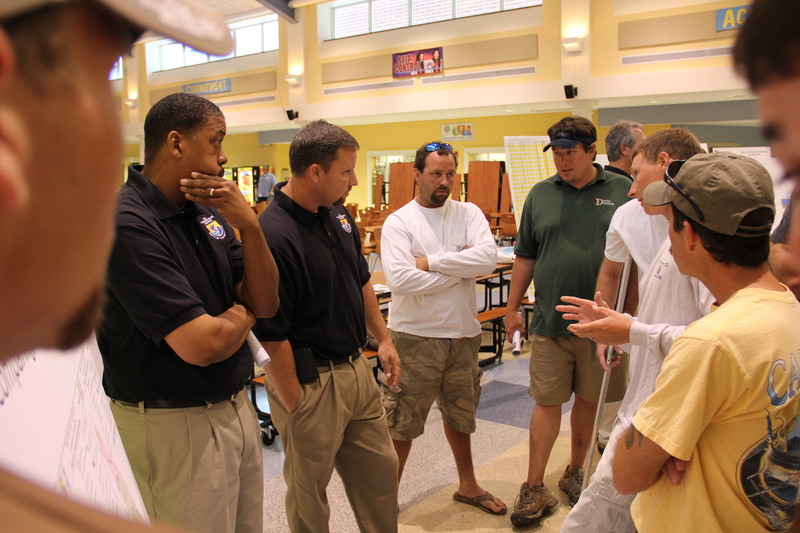A group of young men gathered around Prime Hook National Wildlife Refuge officials inside Cape Henlopen High School Tuesday night. Some were animated, some were surly, some were quiet and listening, and some jumped into the discussion when what they heard struck a nerve. They were farmers and fishermen, punkin chunkers and tradesmen and barbers, all unified by one thing: their love of hunting.
They were at the high school for a public meeting about proposed changes to the way hunting is managed at the refuge. For the most part, they didn’t like what they heard or saw.
Bill Jones, visitors service officer at the refuge, and Oscar Reid, who manages the facility, fielded questions and comments from the men.
“It looks to me like you’re just further restricting hunting on the refuge,” said one man. “It looks like just one more move to push the hunters out.”
“It irritates me when people say that,” said Jones.
“It irritates me that I have to say it,” said the man.
“But it’s wrong,” said Jones. “We’re actually expanding the hunting opportunities by opening up new areas.”
“You’re expanding access but reducing the quality of the hunting,” said another.
“You’re adding a bunch of blind sites way up Prime Hook Creek, which is closer to people, hard to get to and where few people hunt anyway, and taking away blinds in the most productive part of the marsh. You just want to make sure the bird watchers don’t have to see the hunting.”
It was good to see the young men engaged in the process. They stood there for more than two and a half hours taking it all in, letting it all out.
Many of these men learned how to hunt waterfowl at Prime Hook. They learned how to line up their hunting gear the night before, climb out of bed at 3 a.m. and make their way up and down Route 1 when the only other vehicles on the road were pickups pulling camouflaged boats, heading for the drawing station near the refuge entrance.
They stood by their fathers and uncles and friends, watching them fill out cards to be in the predawn drawing, listening to talk about which blinds would be most productive, stamping their feet to stay warm in the dark cold, keeping their fingers crossed that their number would be drawn and they would be able to choose a good blind for a morning shoot.
While most people were still in their beds dreaming, these young men were feeling the excitement of the hunt coursing through them. They cursed clear skies and calm winds. They learned to grin when strong gusts blew thick clouds overhead and felt the giddiness that only hunters feel when the weather worsens with blowing wind, rain and snow.
They also tasted the best that Prime Hook offered hunters as a public facility, when private options were few. In the 1980s, George O’Shea had the freshwater marshes of Prime Hook flourishing. In the wintertime, they held hundreds of thousands of ducks and geese. He and his staff kept the blinds in good shape; he ruled fairly and by the book, and the young hunters learned that you could hunt responsibly and successfully.
Now change is afoot and their world is being shaken. The freshwater marshes are declining rapidly, filling with saltwater from dune breaches north of Primehook Beach. That means less natural food to attract waterfowl.
Federal deficits and debt approaching a trillion dollars make it a one-two punch. Fish and Wildlife Service proposes eliminating all of the duck blinds and deer stands over the next five years. Officials rationalize that eliminating the blinds and stands will give hunters more flexibility to set up where and how they want, noting that 70 percent of all the pubic hunting land on Delmarva is managed this way. But everyone knows the driving factor is the cost. We’re a trillion dollars in debt. Getting that under control will impact us in a lot more ways than just hunting opportunities over the next several years.
The young men don’t like the prospect of losing the blinds where they have learned to hunt, and they don’t like a proposal to replace the onsite lottery with an electronic system that assigns blinds ahead of the season. Their cynicism runs deep:
“The birdwatchers and anti-hunting people will jam the system,” they said.
“People will get blinds and never show up. You guys don’t care because you get the money in advance and it doesn’t make any difference whether hunters show up or not.”
“It’s just some system making money for some senator’s son.”
“Deer hunters at ground level are a lot more dangerous than deer hunters up in stands.”
Officials asked the men to write their comments on sheets provided. “Tell us what works and what doesn’t. Tell us why something doesn’t work, or why something else would work better - not just that something sucks. That doesn’t help us.”
Whatever changes are implemented probably won’t take hold until the 2014 season rolls around.
Given that nature moves a lot faster than government - especially the massive, gridlocked and debt-ridden federal government - most are of the opinion that a big storm rolling in from Delaware Bay will dictate the future of Prime Hook more than the comprehensive plan that has these young men riled.





















































